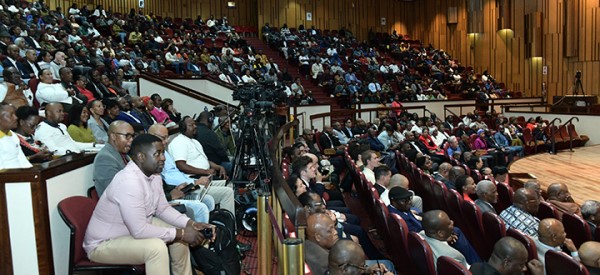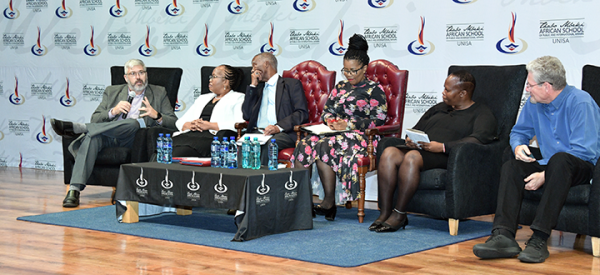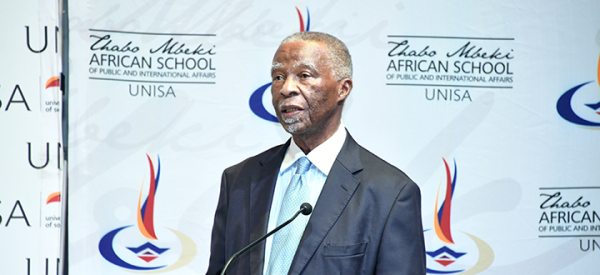

On 28 March 2025, Unisa’s Thabo Mbeki African School of Public and International Affairs (TM-School) hosted Conversations with Thabo Mbeki, an annual event where the Unisa Chancellor enters into a dialogue on pressing issues facing the country and the continent.
This event was attended by members of the diplomatic corps, the university’s Council members, representatives of royal houses, mayors from across the continent, local and national government members, and various political party representatives.

This year's Conversations with Thabo Mbeki once again drew a full house
During a discussion moderated by Prof Anthoni van Nieuwkerk, Head of International and Diplomacy Studies, TM-School, panellists raised the following issues:

From left: Francois Anderson, ICT manager and educator, Kloof High School, Durban; Katlego Mathebe, Chairperson: Multi-Party Women’s Caucus, City of Tshwane; Dr Thabo Mbeki, Unisa Chancellor; Prof Puleng LenkaBula, Unisa Principal and Vice-Chancellor; Sandy Motale, PR Councillor, City of Tshwane; and Prof Anthoni van Nieuwkerk, Head of International and Diplomacy Studies, TM- School
In his response, the Chancellor said that the government’s medium-term development plan is yet to be implemented, adding: "There is still much work due to implement the medium-term development plan found within the National Development Plan (NDP). The NDP is not a plan, but rather a vision meant to be realised by 2030." He urged the audience to have a look at it once it is published for public perusal and approval.

Unisa Chancellor, Dr Thabo Mbeki
On matters of the VAT increase, the Chancellor said that the country’s economy is stationary, adding that raising the VAT price through hiking income tax is not the solution at this time, adding: "As a country we need to sit down and take practical steps in actualising practical plans for the country’s future."
Speaking on AGOA, the Chancellor said: "As a country we must engage in a foreign policy which indicates that we want friendly, mutually beneficial cooperation with everybody around the world. Even if we reach a bilateral agreement with country A, we do so without negating current partners, ensuring that we build good relations with the US, China and other states. The notion that you must have better relations with states that provide more trade than others, is undesirable." Continuing, Mbeki said that South Africa had good relations with the first Trump administration, citing the long history of SA’s interaction with the US, also during apartheid. However, he expressed his disappointment with the current decline of relations between the two countries. "There are many of SA’s products that flood the US market duty-free, therefore, we need a serious sit-down with President Trump and his administration," he added
Mbeki continued to list challenges and opportunities facing South Africa, Africa and their global partners, highlighting the imperativeness of collaborative solutions in an increasingly interconnected world, and importantly, how ambassadors must carry themselves on foreign soil, as their decorum is representative of their country of origin.
Highlighting the situation between the US and SA, Mbeki said, in conclusion, that their bilateral relations need a critical sit-down talk in order to smooth relations impacting political instability, resulting in negative consequences for the country, and setting a gloomy precedent for future partnerships.
Setting the scene In her welcome address earlier in the programme, Unisa Principal and Vice-Chancellor, Prof Puleng LenkaBula, said that she is appreciative of Mbeki, stating that during his presidency he had a vision for the country to have a foresight of the next 100 years by ensuring, among others, the institution of the Square Kilometre Array – an intergovernmental project aimed at building the largest international telescope – as a horizon of thinking about space sciences, data systems, and radio astronomy, among others.

Unisa Principal and Vice-Chancellor, Prof Puleng LenkaBula
She added: "This project is very important for Africa. Although the continent and its historical archives have always been at the centre of astronomy, this is often forgotten. Therefore, when you instituted this project, you helped us to move beyond the MeerKAT radio telescope and others telescopes that South Africa has invested in. Such efforts cumulatively led to Unisa hosting the African Astronomical Society and other astronomers from the global arena."
Continuing, the VC said: "I am appreciative that as we study history, the humanities, and social sciences, including diplomacy, we have seen it as an important imperative to look into the sciences, mathematics and associated disciplines in a context and society that require them to improve the developmental trajectory of our society and extricate ourselves from dependency on industrial systems."
Furthermore, the VC remarked that she is appreciative of the students who are pursuing sciences beyond the sky, adding: "For them, the sky is not a limit but instead, it is a horizon for research, and it helps us map and imagine the future. In addition, it continues to stretch the university’s curricula in the catalytic niche area Space Studies and the Square Kilometre Array."
"Equally important," said the VC, "is that the university’s academics are reflecting with other academics around the role, place and contribution of intellectuals in the shifting geopolitical and economic landscape. We’re continuing to engage on the G20 meeting discussions about how to resource through research and negotiate for the voices of society members to be projected in these engagements that are government-led."
Concluding, the VC said that dialogues such as this gathering are meaningful, and "help us ensure that events such as the G20 are not a mere meet-and-greet, but have the impact to change society, and ensure that Africa’s voices in the global world are not muted but projected, and that we shift the oppression, marginalisation and limitation of Africa in shaping the world".
During his message of support, Aphiwe Dlamini, Secretary-General of Unisa’s National Student Representative Council (NSRC), said that student debt called for ideation on student debt-relief programmes, stating that debt robs students from reaching their potential to contribute to their societies, He added: "Let us find meaningful ways to provide debt relief for a myriad of students so that they can graduate and contribute meaningfully."
Concluding, Dlamini thanked the many sponsors who have heeded the call to help fund students, including the Motsepe Foundation, adding: "Currently the NSRC is engaged in programmes to help support financially challenged students who are performing well academically."
* By Godfrey Madibane, Acting Journalist, Department of Institutional Advancement
** Photography by Shooheima Champion, Multimedia Centre
Publish date: 2025-04-01 00:00:00.0